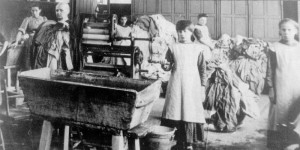 Relevant History welcomes Emma Rose Millar, who writes historical fiction and children’s picture books. She won the Legend category of the Chaucer Awards for Historical Fiction with Five Guns Blazing in 2014. Her novella The Women Friends: Selina, based on the work of Gustav Klimt and co-written with author Miriam Drori, was published in 2016 by Crooked Cat Books and was shortlisted for the Goethe Award for Late Historical Fiction. Her third novel, Delirium, a Victorian ghost story published by Crooked Cat Books, was shortlisted for the Chanticleer Paranormal Book Awards in 2017. Emma’s historical poems for children are published by The Emma Press. To learn more about her and her books, follow her on Facebook, Twitter, and Goodreads.
Relevant History welcomes Emma Rose Millar, who writes historical fiction and children’s picture books. She won the Legend category of the Chaucer Awards for Historical Fiction with Five Guns Blazing in 2014. Her novella The Women Friends: Selina, based on the work of Gustav Klimt and co-written with author Miriam Drori, was published in 2016 by Crooked Cat Books and was shortlisted for the Goethe Award for Late Historical Fiction. Her third novel, Delirium, a Victorian ghost story published by Crooked Cat Books, was shortlisted for the Chanticleer Paranormal Book Awards in 2017. Emma’s historical poems for children are published by The Emma Press. To learn more about her and her books, follow her on Facebook, Twitter, and Goodreads.
*****
 Worked to the bone, starved, beaten, and abused: this was the fate of some 30,000 women whose care was entrusted to nuns in Ireland’s Magdalene Asylums, also known as Magdalene Laundries. These institutions were set up during the eighteenth-century to house prostitutes—so-called “fallen women”—but quickly became places of unknown cruelty and hardship, where any women and girls as young as nine, branded as “undesirable” by the Church, could be incarcerated. For over two hundred years, unmarried mothers, women deemed “promiscuous,” or those who defied their husbands or fathers could find themselves locked up in one of the asylums. Others had learning difficulties or had been the victims of rape or sexual assault. Some were sent there simply for being “too pretty.” Once there, they were starved, beaten, and forced into backbreaking work in the asylum laundries. Babies were usually taken away from their mothers and offered up for adoption.
Worked to the bone, starved, beaten, and abused: this was the fate of some 30,000 women whose care was entrusted to nuns in Ireland’s Magdalene Asylums, also known as Magdalene Laundries. These institutions were set up during the eighteenth-century to house prostitutes—so-called “fallen women”—but quickly became places of unknown cruelty and hardship, where any women and girls as young as nine, branded as “undesirable” by the Church, could be incarcerated. For over two hundred years, unmarried mothers, women deemed “promiscuous,” or those who defied their husbands or fathers could find themselves locked up in one of the asylums. Others had learning difficulties or had been the victims of rape or sexual assault. Some were sent there simply for being “too pretty.” Once there, they were starved, beaten, and forced into backbreaking work in the asylum laundries. Babies were usually taken away from their mothers and offered up for adoption.
Although these institutions were run by the Church, they were also widely supported by the Irish government. In addition to the women and girls being sent there by their families, there were also those who came from psychiatric units and prisons. The government channeled money into the asylums in exchange for housing the women and laundry services, which were provided by the inmates there.
During the twentieth century, rumours circulated about the abuses taking place in Ireland’s Magdalene Asylums, but those survivors who did speak about their experiences there were often shamed or ignored. The public did not believe that institutions run by the Church would allow or endorse such ill treatment of the women and children under their protection. Many survivors would not disclose details of what went on in the laundries, and therefore details are scant.
 It was not until the discovery of a mass grave at Our Lady of Charity Convent in Dublin that the media became involved and printed articles questioning goings-on at the asylums. One hundred and fifty-five bodies were found in the grave, but only seventy-five death certificates had been issued. The nuns claimed there had been an administrative error, but there was a public outcry, and ultimately the United Nations called for a public enquiry. Suddenly, women began perusing cases for violations against Human Rights and making disclosures about the abuse they had suffered.
It was not until the discovery of a mass grave at Our Lady of Charity Convent in Dublin that the media became involved and printed articles questioning goings-on at the asylums. One hundred and fifty-five bodies were found in the grave, but only seventy-five death certificates had been issued. The nuns claimed there had been an administrative error, but there was a public outcry, and ultimately the United Nations called for a public enquiry. Suddenly, women began perusing cases for violations against Human Rights and making disclosures about the abuse they had suffered.
Survivors’ stories
Marina Gambold, was placed in a laundry by her local priest. She described being forced to eat off the floor after breaking a cup and getting locked outside in the cold for a minor transgression. She was made to work for ten hours a day and fed bread and dripping.
Mary Smith was placed in the Sundays Well Laundry in Cork after being raped. Nuns there told her they would look after her in case she became pregnant. Once incarcerated, her hair was cut off and she was stripped of her identity. She was forced to work in silence and to sleep in the cold. Mary does not remember how long she spent in the laundry due to the abuse she suffered.
One survivor known only as Bridget recounted being taken by the nuns to see a lady who was dying in agony. Bridget was just sixteen when the nuns said to her, “Do you see this? She has never done anything and she is suffering in agony for your sins.”
Another woman who had survived the same laundry in Cork said she was forced to spend all night in a room with a corpse. She described nuns humiliating girls who had wet the bed by wrapping their wet sheets around them and making them kneel on the dormitory floor with a sign on their back saying. “Dirty, filthy, lazy girl.”
Public outcry and enquiry
Partly due to the outcry which followed the discovery of the mass grave, the last Magdalene Asylum closed its doors in 1996. Of the forty women discovered there, most were elderly or had learning disabilities, nine had no known living relatives; all decided to stay with the nuns.
While religious institutions remained silent, a long public campaign ensued, resulting in the publication of the McAleese report, which detailed the abuse of ten thousand women in Magdalene Asylums between 1922 and 1996. The Irish government finally issued a formal apology in 2013 and set up a fund for survivors.
The Irish prime minister, Enda Kenny, spoke in front of a packed parliament and apologised for what he called “a national shame.”
I on behalf of the state, the government and our citizens deeply regret and apologise unreservedly to all those women for the hurt that was done to them, and for any stigma they suffered, as a result of the time they spent in a Magdalene Laundry. For ninety years Ireland subjected these women, and their experience, to a profound indifference. By any standards it was a cruel and pitiless Ireland, distinctly lacking in mercy. We swapped our public scruples for a solid public apparatus.
Kenny’s speech was followed by a standing ovation for him and the twenty Magdalene survivors who were present in the public gallery.
Many religious groups that ran the asylums refused to contribute to the fund and have turned away researchers looking for more information. Several groups including Justice for Magdalenes and the National Women’s Council of Ireland are still campaigning for a public memorial for survivors and for compensation for children born to inmates of the asylums.
*****
 A big thanks to Emma Rose Millar! She’ll give away a paperback copy of Delirium to someone who contributes a comment on my blog this week. I’ll choose the winner from among those who comment by Friday at 6 p.m. ET. Delivery is available in the U.K. only.
A big thanks to Emma Rose Millar! She’ll give away a paperback copy of Delirium to someone who contributes a comment on my blog this week. I’ll choose the winner from among those who comment by Friday at 6 p.m. ET. Delivery is available in the U.K. only.
**********
Did you like what you read? Learn about downloads, discounts, and special offers from Relevant History authors and Suzanne Adair. Subscribe to Suzanne’s free newsletter.
